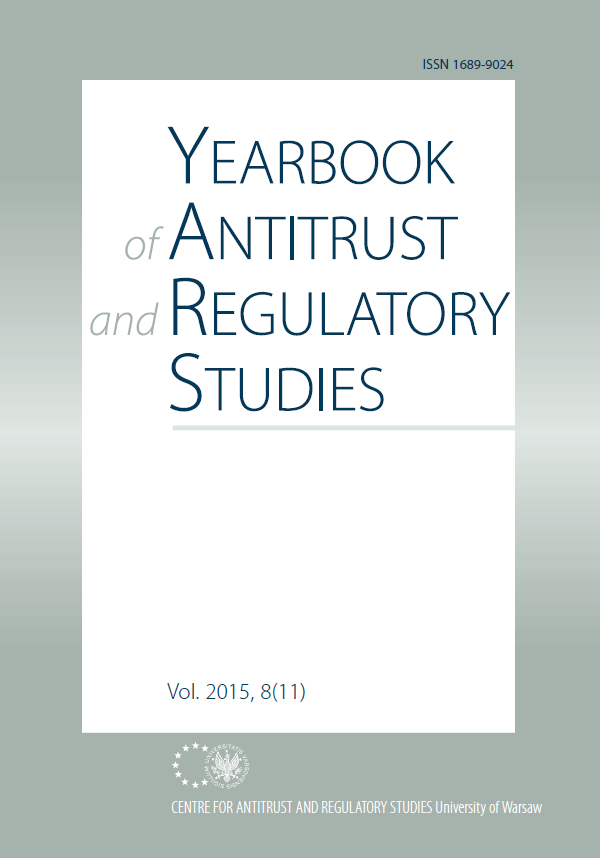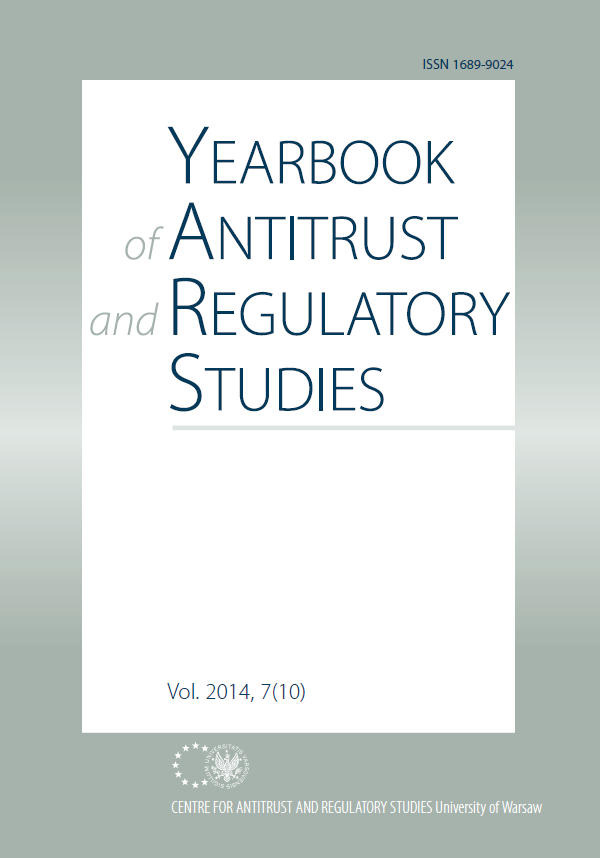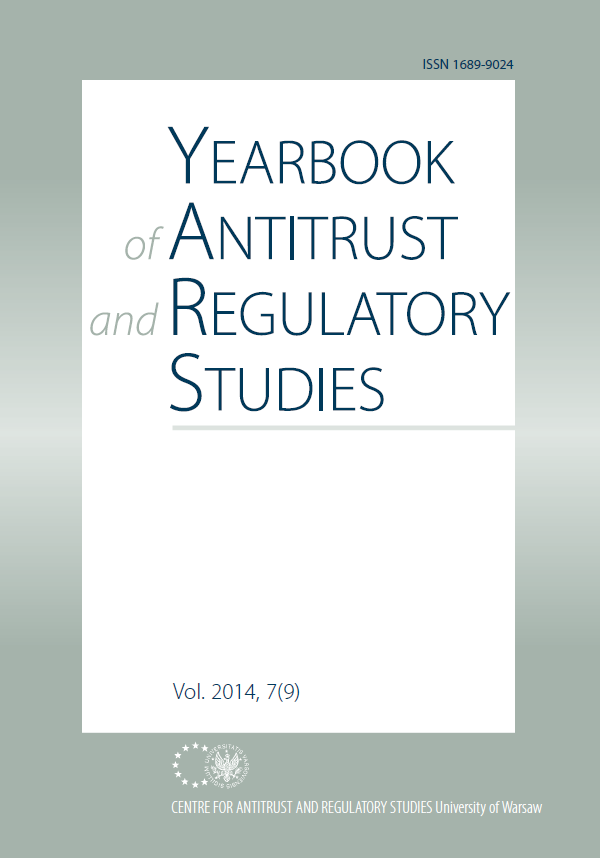
We kindly inform you that, as long as the subject affiliation of our 300.000+ articles is in progress, you might get unsufficient or no results on your third level or second level search. In this case, please broaden your search criteria.



![Małgorzata Król-Bogomilska, Zwalczanie karteli w prawie antymonopolowym i karnym [Combating cartels in antitrust and criminal law], Warszawa 2013, 511 p](/api/image/getissuecoverimage?id=picture_2015_45136.png)

In the complex procedural aftermath of Regulation 1/2003, a more systemic approach to antitrust enforcement by various authorities – EU and national, judicial and administrative – could supplement existing cooperation mechanisms with a truly integrated system of rules and decisions. This is the core argument of this article, as it examines the effects of antitrust enforcement decisions in the EU from three different but related angles.
More...
The 2013 Amendment to the Japanese Antimonopoly Act, promulgated on 13 December 2013, abolished the current Hearing Procedure System for administrative appeals administered by the Japan Fair Trade Commission. However t he New Amendment raises a number of problems concerning procedural issues, including independence of the Japan Fair Trade Commission, limitations of judicial review, and exclusive jurisdiction of the Tokyo District Court. This paper reviews related discussions regarding these issues and points out additional possible grounds for the criticism of the 2013 Amendment. In addition, following the abolition of the Hearing Procedure System, the 2013 Amendment sets out new provisions on hearing procedures under the Antimonopoly Act. This paper thus makes a detailed comparison between the newly enacted provisions on hearing procedures under the Antimonopoly Act and the relevant provisions under the Administrative Procedure Act, which is Japan’s main law on administrative procedures. By comparing these provisions, the author examines to what extent procedural fairness is accomplished under the Antimonopoly Act
More...
According to EU competition law, the existence of an anticompetitive agreement can be inferred from a number of coincidences and indicia only in the absence of another plausible explanation of the facts at stake. According to U.S. federal law (antitrust law included), only a complaint that states a plausible claim for relief can survive a motion to dismiss at the pleading stage. What is plausible, however? After explaining the relationship between facts and evidence law, this chapter analyses the general meaning of the notion of plausibility, discusses the degree of discretion that it introduces, how it affects the justifications that judges and fact-finders make for their choices, and remarks on how this concept relates to substantial accuracy. On the other hand, the chapter acknowledges that antitrust law, by relating our understanding of what is plausible to economic models, debunks these concerns and raises another striking issue. Since economics is rooted in various axioms and value-choices, the link that antitrust law establishes among plausibility, standards of proof and economics grants to these axioms and value-choices the possibility of affecting the antitrust decisions about facts, although these decisions (as all factual decisions) should amount to pure descriptions of the concrete facts disputed at trial or during the administrative procedure.
More...
Inspections carried out in competition law cases are undoubtedly an effective instrument of competition law enforcement since they constitute an efficient means to obtain relevant evidence. Nevertheless, this institution often leads to a serious interference with the sphere of an undertaking’s rights, in particular the right to defence. Several problems can be observed when it comes to the conduct of inspections in the framework of competition law in Europe. These relate, inter alia, to the right to defence, including the privilege against self-incrimination and legal professional privilege, right to privacy, right to an effective remedy and the principle of proportionality. Most of these questions are common to various European states since they emerge at the level of the European Union, in old and new EU Member States (such as Poland) as well as in countries outside the EU (Switzerland). This paper focuses on the questions of fishing expeditions and subsequent electronic searches. They are analysed mostly in the light of the principle of proportionality. The paper presents selected controversies and developments in relation to the powers of inspection granted to competition authorities as well as procedural safeguards available to undertakings.
More...
The paper gives an overview of the South African Corporate Leniency Policy which is a whistleblowing tool used by Competition agencies to detect and punish cartel behaviour. The leniency applicant provides vital information to the competition authorities to fulfil the needs of this Policy. This information would be of great assistance to a claimant harmed by the cartel and who wishes to submit a claim for follow-on damages. Revealing this information results in serious implications for both leniency applicants and civil damages plaintiffs and poses a dilemma to Competition authorities. This paper questions whether the interest of the leniency applicant should be protected or should the information be handed over to the claimant to pursue a case for damages. After considering the status quo of the South African legal context, a survey of the EU and USA position on this is provided. The paper concludes on how a balance should be struck.
More...
The increasingly frequent reference to the protection of fundamental rights in the application of EU antitrust law is a trend that has grown significantly alongside the reforms brought about by Regulation 1/2003. Greater attention being given to fundamental rights is evident in the development of the application of the AEG Telefunken presumption, whereby a parent company may be penalized for the antitrust infringements of its wholly-owned subsidiary on the ground that the parent and the subsidiary constitute a single economic entity, and hence a single “undertaking”. Recently, the Court of Justice has confirmed the lawfulness of that presumption. However, increasing attention is now given to the adequacy of the Commission’s reasoning, particularly when the Commission rejects arguments made by parent companies to rebut the presumption. These developments suggest that the growing importance of fundamental rights protection may under certain conditions be a limit the principle of the effectiveness of EU competition law as well as a new legal tool to rectify (as much as possible) the EC’s “conflict of interests” with regard to its two “souls”, the “prosecutor” and the “judge”.
More...
This paper considers the increasing use of “negotiated” instruments of European competition law (ECL) enforcement as illustrated by the example of the European Commission’s (EC) enforcement practice directed at firms of American and East Asian origin. The paper first defines the notion of “negotiated” instruments of ECL enforcement as a non-confrontational enforcement method that centres on the existence of a public-private dialogue and mutual will to solve the contested issue, which in turn facilitate mutual benefits in enforcement outcomes (e.g. faster market improvements v. no fines). Three key “negotiated” instruments of ECL enforcement are presented next: conditional merger clearances, commitments decisions, as well as leniency and the settlement procedure. The EC’s decision to introduce negotiated enforcement instruments into its toolkit has been largely embraced by the market. Their ever growing practical application suggests that public-private dialogue is becoming a rule, rather than an exception, in public enforcement of ECL. This thesis is illustrated by a selection of ECL cases involving US (e.g. Microsoft) and East Asian (e.g. Samsung, Sony) companies which chose to cooperate with the EC in order to generate tangible benefits for themselves, which are largely precluded in a more adversarial procedure.
More...
This article analyzes the legal preconditions for the harmonization of Ukrainian legislation in the field of competition law with the law of the European Union. Due to its evolution, it is noticeable that competition law has been, and remains, a priority in the harmonization process of Ukrainian legislation. This paper provides a detailed analysis of competition related provisions of the Association Agreement. The latter contains norms on the obligatory approximation of substantial competition law provisions and sets out the necessity to transform their enforcement system. Special attention is paid to the analysis of state aid which currently remains unregulated in Ukraine.
More...
Fourteen years after the enactment of Indonesian Competition Law, the public has had the chance to witness the enforcement practice of the Commission for the Supervision of Business Activities (the Kppu), the competition supervisory authority of Indonesia. Being recognized as an aggressive competition agency, the enforcement of Indonesian Competition Law seems to largely rely on the discretion of the Kppu. However, a review needs to take place not only of how the competition authority accomplishes its tasks, but also how the enforcement process is outlined in the provisions of the Law itself. Around 72% of the cases dealt with by the Kppu concern bid-rigging, 14% cover other types of cartel practices, further types of anticompetitive conduct account for the rest. Despite being criticized as having excessive authority covering the function to investigate, prosecute, and make rulings, the Kppu faces problems in battling cartel practices because major legal flaws exist, for instance concerning collecting evidences. The discussion will be limited to the combat with cartels. Competition law enforcement through the Kppu is administrative in nature albeit with some criminal law influences (evidence). Although it is possible to enforce the law by means of criminal injunctions and private claims, they have rarely been used so far, mainly because Indonesian Competition Law lacks clarity. Problems with existing procedures are rooted in the Kppu’s inability to obtain sufficient evidences. Two propositions are made how to deal with these difficulties – using indirect evidence and implementing a leniency programme, both based on existing Indonesian Competition Law or by amending the Law and inserting new provisions which would explicitly allow the use of both indirect evidence and a leniency programme.
More...

The paper first deals with the conditions and prerequisites of adopting European law before the former “real-socialist” countries joined the EU. The key role of European Courts is described by showing that they worked as de facto virtual legislators even before accession. It is emphasized that European Courts have provided the courts and antitrust authorities of new Member States with an inestimable value-based rientation. The EU judicial practice enhanced national legal standards and lega culture in the respective countries. The second part of the contribution contrasts with this positive tone. An example of a serious inconsistency in values between the Court of Justice of the EU and the European Commission is shown concerning their divergent views on “uni-sex insurance” and the draft directive on women’s representation in board member positions. There is substantial disagreement in this matter, which weakens and endangers the integrative role of the CJEU and its habitual value-confirming impact. This disparity could to some extent depreciate the role of European Courts as „motors of integration”
More...
The aim of this paper is to analyse the interplay between the EU’s external (pre-accession) and internal (post-accession) governance model in the field of competition law and to reach a deeper understanding of the EU’s Europeanization strategy at the intersection of these two governance models. The paper will critically examine the effectiveness of the internal governance mechanisms of Regulation 1/2003 with regard to the goals of the decentralized enforcement system, as well as with regard to their effectiveness in steering post-accession compliance and Europeanization among the Member States. Following the Introduction, section II of the paper maps out the EU’s external law and governance model that applies vis-à-vis third countries that wish to join the EU. In section III, the paper examines the extent and the manner in which this external model has shaped the EU’s internal governance model vis-à-visits Member States. Section IV analyses Regulation 1/2003 as the main driver behind the effective implementation of EU competition law in the Member States as well as its governance mechanisms as they framed the Europeanization process. In order to evaluate the effectiveness of post-accession compliance, section IV examines the compound procedural framework, composed of EU and national administrative rules, which underlies and challenges the enforcement of EU competition law. Also specifically investigated here is how the administrative capacity of national competition authorities affects competition law enforcement. This inquiry is enriched in section V with a detailed assessment of the European Competition Network as the EU’s main mechanism for the monitoring of Member States’ post-accession compliance with EU law
More...
A decade of decentralized enforcement of EU competition rules under the procedural framework of Regulation 1/2003 has produced a diverse enforcement record that varies among Member States. While the numbers of notified investigations and infringement decisions based on Articles 101 & 102 TFEU are impressive, some EU jurisdictions have demonstrated an only negligible participation in the direct enforcement of EU competition rules. After joining the EU in 2004, Estonia has harmonized its competition legislation with EU standards and pursued active criminal enforcement of antitrust rules. At the same time, EU competition rules are absent from the enforcement practice of the Estonian competition authority and national courts. The present paper provides an overview of the specifics of the Estonian legal system including its substantive, procedural and institutional components. This overview demonstrates how the diversity and complexity of the procedural framework for the enforcement of competition rules (administrative, misdemeanour and criminal proceedings) effectively prevented EU competition rules from penetrating the national legal system
More...
This paper provides a study of the impact of EU competition rules on Lithuanian legislation and legal practice. It was found therein that the Lithuanian law on competition, its competition authority and courts do not adhere to all objectives of EU competition law consistently. In Lithuania, the most followed objectives of EU competition law are primarily that of the internal market and consumer welfare. The European Commission looks at both: competition and the creation and preservation of the internal market, as promoting consumer welfare and an efficient allocation of resources; it proclaims that the role of competition law is to prevent harm to consumers. The Lithuanian law on competition fully corresponds to the provisions of the Treaty. Full compliance is endorsed by the National Competition Authority while Lithuanian courts strive to maintain such policy by referring to the internal market and consumer welfare standards. Both the Lithuanian competition authority and its courts defend consumer welfare from higher prices, reduced output, less choice or lower quality of goods or services, or diminished innovation. Existing legislation and other procedural rules entitle the competition authority and courts of Lithuania to enforce competition law without significant obstacles. Applicable procedures ensure transparent, independent, and professional decision-making by the competition authority, confidentiality, as well as an effective process of investigation and information collection. The Commission’s move towards the realignment of competition law with modern economic thinking on efficiency and welfare has begun. It entails not just the adoption of the consumer welfare standard, but also the application of the ‘effects’ approach. However, EU Courts have not been unambiguously following the consumer welfare standard, as endorsed by the Commission. They protect competitors themselves, rather than competition, ruling in favour of small or medium-sized firms in order to keep markets open and achieve fairness. They tend to protect the structure of the market from indirect possible long-term effects on consumers, rather than just from immediate direct effect on them.Some evidence was found of a ‘more economic’ approach being applied over the last decade as it started to find its way into the enforcement of Lithuanian competition law. Although this trend is likely to increase in the future, it is, nevertheless, still not the prevailing approach in Lithuania. At the same time, the national competition authority and courts strictly follow the guidelines and communications of the Commission on this issue
More...![Anna Piszcz, Sankcje w polskim prawie antymonopolowym [Sanctions in Polish Antimonopoly Law], Wydawnictwo Temida 2, Białystok 2013, 483 p.](/api/image/getissuecoverimage?id=picture_2014_45140.png)
